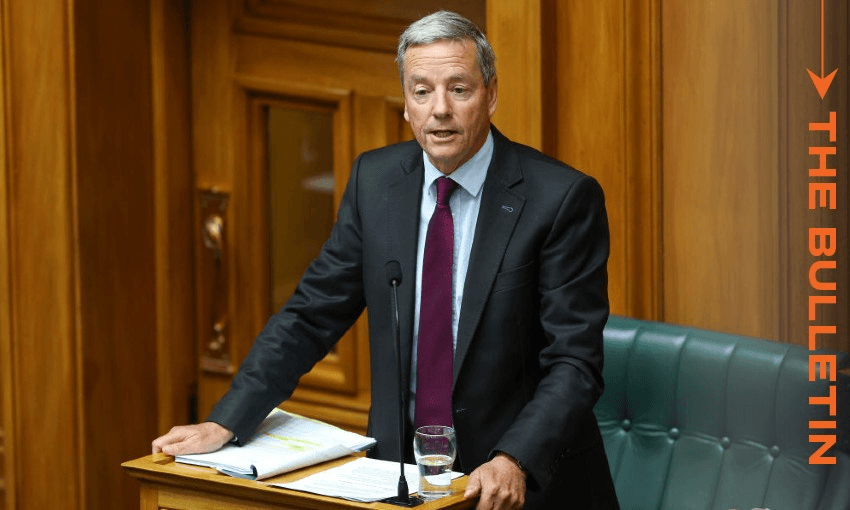Millions of dollars are lost to scams each year. Should more attention be on the social media giants that platform them? Stewart Sowman-Lund writes in today’s edition of The Bulletin.
To receive The Bulletin in full each weekday, sign up here.
‘What are the gaps now?’
It was only a month ago that Andrew Bayly’s career as a politician was on the line. Now, he’s been tasked with a major new governmental role: anti-scam czar. As reported by the Herald’s Chris Keall (paywalled), the consumer affairs minister will take charge of the government’s efforts to tackle scams, a role that was previously split across six ministers including Judith Collins as GCSB minister and Brooke van Velden as internal affairs minister. He’s set to convene a top level meeting of bosses from across the telecommunications and banking sectors early next month. “I’m going to get them all in the same room and the discussion will be around, ‘What are the gaps now?’”
Some of this work is already under way. Banks are currently rolling out payee confirmation, which Bayly told RNZ was a good start. “But also, I think it’s incumbent on the government to act and coordinate activity,” he said. And while a lot of the focus appears to be on the banking sector, some have argued social media giants – those that often platform scams – deserve greater scrutiny.
Minister for big tech
The Spinoff’s Duncan Greive wrote substantively on this subject yesterday morning, arguing that New Zealand deserved a standalone minister for “big tech”. The column was published before the news of Bayly’s role was revealed. Reflecting on an interview with Bayly, Greive noted that the man now charged with tackling a scam epidemic has spent much of the year going after big banks, but sounded “like a total supplicant when talking about Facebook”.
“We want to make sure that they are a part of the mix,” Bayly told Greive. “The unfortunate thing is, [Meta is] obviously a global company, and New Zealand’s a very small part of that pie… The issue with the social media platforms is, how do you get them to engage and concern themselves about New Zealand?”
As Greive noted, it’s undoubtedly complex. But New Zealand is now lagging behind other countries when it comes to substantively dealing with large tech companies. In a wide-ranging cover story also published yesterday, Greive questioned why media coverage tended to focus on banks and victims rather than the social media platforms that run the scams in the first place. And banks agree more should be done. “For a company that’s amongst the most valuable in the world, with an absolute black belt in creating algorithms that drive behaviour, I cannot for life of me understand how Meta wouldn’t be able to be amongst the most effective at blocking this type of thing,” said Kiwibank CEO Steve Jurkovich.
The scale of the problem
The backstory here is well traversed, with frequent media reports on the proliferation of scams. Writing for The Spinoff in August, Dylan Reeve presented what he described as a “soul-destroying” attempt to report ads on Facebook that were actually scams, including those that purported to be from high profile figures like Clarke Gayford. There have been other well reported stories. The Herald’s Lane Nichols reported recently on a pensioner that fell victim to a deepfake Christopher Luxon, losing over $224,000 in the process.
The reporting by Reeve and others highlights the obvious danger from scams – something that most of us will have encountered and, at this point, probably begrudgingly accept as part and parcel of being on social media. But while they may, to some, look obviously fake – they are clearly working. Bayly, speaking to The Post, described it as the “third largest economy in the world”.
There are questions over the exact scale of the problem here in New Zealand. The most widely reported figure, from PaymentsNZ, suggests we lost nearly $200m to scams in the past 12 months. Bayly said the real losses are likely to be higher given not all scams are reported. And Netsafe has claimed the problem could be more like $2.3bn, based on a survey of over 1,000 people.
Pressure mounts on Kiwisaver providers
Moving away from scams now but sticking with banks. The Spinoff’s Gabi Lardies has reported on a new campaign targeting ASB due to its Kiwisaver funds having investments in Motorola, a company that supplies Israel’s military. Six thousand people have signed a petition threatening to switch banks should ASB not divest.
In a written statement to The Spinoff, ASB said the weight of the investments across its Kiwisaver funds ranges from 0.04% to 0.19% of net asset value – around 0.1% of its total Kiwisaver investments. The statement also noted that ASB is “closely following” and “deeply concerned” by the ongoing conflict. Over three million New Zealanders have Kiwisavers across 350 funds.
